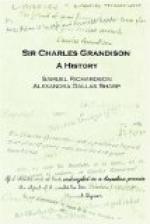Well, but what am I now to say about the Danbys? Richard has made his report; Sir Charles has told us some things: yet I will only give you heads: make out the rest.
In the first place, my brother went to Mrs. Harrington’s (Miss Danby’s aunt:) she did every thing but worship him. She had with her two young ladies, relations of her late husband, dainty damsels of the city, who had procured themselves to be invited, that they might see the man, whom they called, a wonder of generosity and goodness. Richard heard one of them say to the other, Ah, sister, this is a king of a man! What pity there are not many such! But, Harriet, if there were a hundred of them, we would not let one of them go into the city for a wife; would we, my dear?
Sir Charles praised Miss Danby. She was full of gratitude; and of humility, I suppose. Meek, modest, and humble, are qualities of which men are mighty fond in women. But matrimony, and a sense of obligation, are equally great humblers even of spirits prouder than that of Miss Danby; as your poor Charlotte can testify.
The young gentlemen, with the rest, were to meet Sir Charles, the bride, and these ladies, at St. Helen’s, I think the church is called.
As if wedlock were an honour, the Danby girl, in respect to Sir Charles, was to be first yoked. He gave her away to the son Galliard. The father Galliard gave his daughter to Edward Danby: but first Mr. Hervey gave his niece to the elder.
One of the brides, I forget which, fainted away; another half-fainted— Saved by timely salts: the third, poor soul, wept heartily—as I suppose I shall do on Tuesday.
Never surely was there such a matrimony promoter, as my brother. God give me soon my revenge upon him in the same way!
The procession afterwards was triumphant—Six coaches, four silly souls in each; and to Mr. Poussin’s, at Enfield, they all drove. There they found another large company.
My brother was all cheerfulness; and both men and women seemed to contend for his notice: but they were much disappointed at finding he meant to leave them early in the evening.
One married lady, the wife of Sir —— somebody, (I am very bad at remembering the names of city knights,) was resolved, she said, since they could not have Sir Charles to open the ball, to have one dance before dinner with the handsomest man in England. The music was accordingly called in; and he made no scruple to oblige the company on a day so happy.
Do you know, Harriet, that Sir Charles is supposed to be one of the finest dancers in England? Remember, my dear, that on Tuesday—[Lord help me! I shall be then stupid, and remember nothing]—you take him out yourself: and then you will judge for yourself of his excellence in this science—May we not call dancing a science? If we judge by the few who perform gracefully in it, I am sure we may; and a difficult one too.




